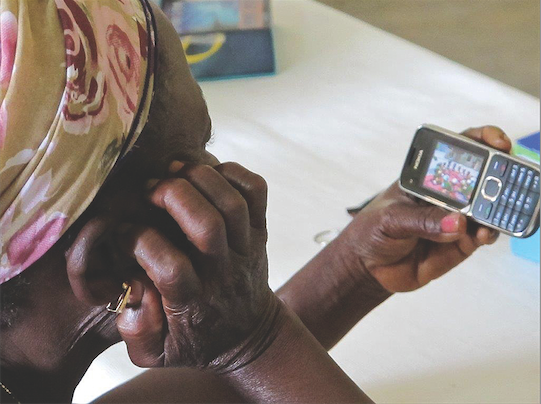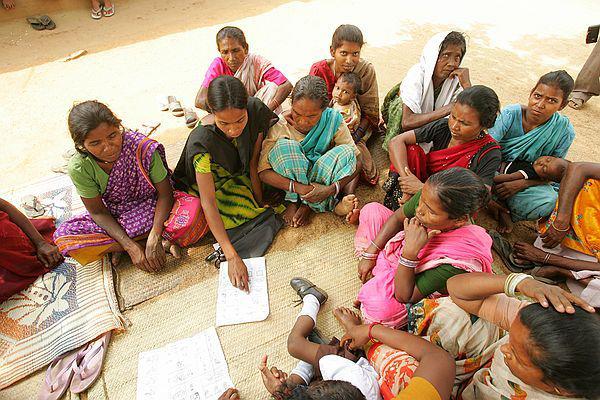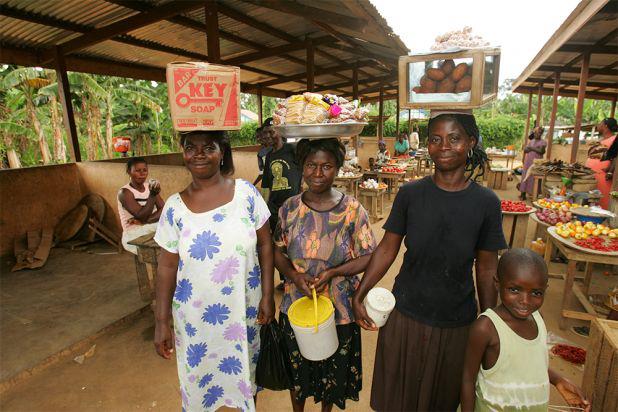Bringing Silicon Valley Innovation to a 68-Year-Old Nonprofit: Freedom from Hunger
Categorized as: Africa, Grantee, Job Creation, Our Partners, Poverty Alleviation, Stories & Tagged as: Bill Souders, Freedom from hunger, Mobile banking, Silicon Valley, Social entrepreneurism, Technology on November 1, 2014.

Editor’s note: Bill Souders joined Freedom from Hunger in 2014 as Vice President of Technology, Strategy, and Integration. He is responsible for driving technology planning and implementation to support programs and general business operations. Previously based in Johannesburg, South Africa, Souders was the Cisco Program Director for the New Partnership for Africa’s Development (NEPAD), working with the technical body of the African Union aiming to eradicate poverty, accelerate the empowerment of women and create sustainable growth. Bill shares why he left high tech to create a startup program inside one of America’s oldest nonprofits. From Cisco to West Africa, an engineer shares his passion to bring technological advances to the ultra poor–now via the nonprofit field. Bill Souders guest writes from Freedom from Hunger.
 By Bill Souders for Freedom from Hunger
By Bill Souders for Freedom from Hunger ![]()
Using Technology for a Greater Purpose
Having worked in Silicon Valley high-tech companies for more than three decades, I had always hoped that I was making a contribution to improving the quality of life for humankind. The technological advances that I have been a part of over the past 30 years are truly remarkable and have changed the way most of us conduct our daily lives.
I have assumed various roles at Cisco included leading their Global eLearning Technologies team, serving as Program Director for the Technology in Education pilot in Africa, and running Global Field Operations for Corporate Affairs. One major takeaway from my experiences was a growing awareness of how many people have yet to reap the benefits of technology that most of us now take for granted.
“Once you look into the faces of individuals and families starving for resources, it is very difficult to look away.”
My job afforded me the opportunity to travel the world, which positioned me to observe firsthand what life is like for people who live on the edge of survival every day, illustrating the massive division between wealth and poverty that I always knew existed globally. Once you look into the faces of individuals and families starving for resources, it is very difficult to look away.
Thus began my transition into a role at Freedom from Hunger, an organization that helps to address this glaring discrepancy in wellbeing and social mobility by providing women and youth with education, strategies, and tools to cope with daily challenges associated with extreme poverty. Today, Freedom from Hunger is taking a multi-pronged approach to leverage technology to further this mission.
 This group will be able to learn faster and track business more accurately with mobile-phone tools being developed by Freedom from Hunger.
This group will be able to learn faster and track business more accurately with mobile-phone tools being developed by Freedom from Hunger.
Freedom from Hunger’s Self-Help Approach
Freedom from Hunger has been promoting food security for more than 68 years and, for the last 26 years, has been working with the microfinance sector to deliver other vital development services. We have introduced a comprehensive distance learning program for microfinance field agents in Latin America. Field agents are the primary point of contact with clients in the field and play a vital role, providing services as well as building relationships of trust. The distance learning program is intended to:
- develop and strengthen core competencies that will contribute to greater professional success for field agents and result in better quality of services for clients;
- align with emerging regulatory and compliance requirements to promote quality of service, consumer protection and social responsibility;
- provide an effective organizational management tool that allows supervisors to better manage training programs through an online system, that simplifies the tracking of participation and performance.
We are also providing animated training tools and job aids to help low literacy, front-line savings group facilitators in West Africa. These tools are provided in their local language and use audio rather than text.
Finally, we are continuing to develop new engaging, interactive ways to share what we have learned with our peer practitioners around the world. We recently created an online guide assessing the benefits of providing financial education and services to youth. The online guide is available in English, Spanish, and French.
Of course, technology on its own is not a panacea, but there are some very promising developments.
Advances in information and communications technologies (ICTs), most notably the expansion of cellular networks across the developing world, along with rapid cost reductions in technologies like smart phones and tablets, can provide the potential for us to more effectively reach our target audiences.
 These women in West Africa will gain access to banking, healthcare, and business services, right through the animated training tools coming to them over their form of home computers–the mobile phone. See animated video below.
These women in West Africa will gain access to banking, healthcare, and business services, right through the animated training tools coming to them over their form of home computers–the mobile phone. See animated video below.
A Way Forward for the World’s 2.5 Billion Unbanked
It is estimated that among the roughly 2.5 billion unbanked, nearly 1.7 billion have some access to a cell phone. Despite Freedom from Hunger’s 68-year old legacy, we truly are operating as a start-up organization, working diligently to take advantage of current trends in access to technology to better serve the poor communities across the world and working towards eradicating poverty globally.
Building on a long and successful track record of delivering value through our network of partners, Freedom from Hunger is now actively establishing new partnerships with mobile network operators (MNOs), commercial banks, health service providers, academic institutions, government agencies, local NGOs, international NGOs and foundations. Together, we can create integrated solutions to provide information, education, behavior reinforcement, and the provisioning of other services for rural, poor communities.
Yet while the opportunities are abundant, the implementation challenges remain significant.
“I get to touch every aspect of the “business”: developing complex needs assessments, formulating new business models (such as fees for service), designing the solutions and, ultimately, bringing products to market.”
Working for a small nonprofit affords me the opportunity to participate much more fully in the program development process than was ever possible when I was part of a large, for-profit corporation. I get to touch every aspect of the “business”: from developing a complex needs assessments and formulating new business models (such as fees for service), to participating directly in the design and development of the solutions and, ultimately, bringing products to market.
I am thrilled to be working with an organization that continues to evolve and innovate. Freedom from Hunger is leveraging decades of field experience and research about how to meet the needs of underserved communities, and is continuing to develop new services and support for those who need it most.
I am very pleased to see the sector moving toward more collaborative, integrative, and multi-sector approaches to address complex global challenges. Together, we can avoid “reinventing the wheel” as we experiment with various technology advances and collaborate and learn from one another. In the end, a genuine commitment to collaboration will enhance everyone’s ability to achieve our shared goals of social inclusion and economic resilience.
All photographs and video courtesy of Freedom from Hunger.
LEARN more about Freedom from Hunger’s work here.
DONATE directly to the Freedom from Hunger here.
SHARE this story on Facebook and Twitter!
SUBSCRIBE! Like what you see? Click here to subscribe to Seeds of Hope!
